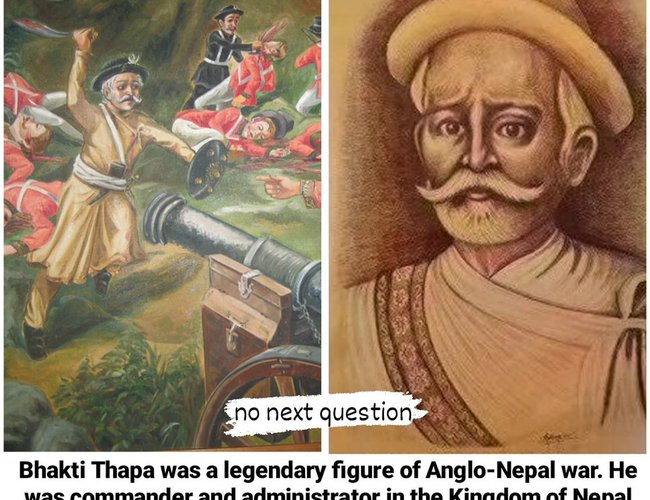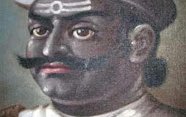
History sees the present in the light of the past. Famous German historian Leopold von Ranke, founder of modern source based history has said " History has been assigned the office of judging the past , instructing the present for the benefit of the future ages".
Acknowledging the significance of great role played by various individuals in the past British Historian J.H. Plumb has said " History seeks to deepen understanding about men and society not for its own sake but in the hope that a profound awareness will help to mould human attitudes and human action".
Unfortunately, our society is not seen to be interested to care about our glorious past history and draw inspiration even from the life of a person like Bhakti Thapa, who had played a key role in unifying the almost entire present day western Nepal and still further to the west up to Sutlez river now in India. Ultimately he had sacrificed his life in Deothal Battle when he was already 74 years old defending our country against British colonialism, which was the greatest evil of that time.
From Insignificant State to a Formidable Power
Historian L.F. Stiller has written that during the regency of Bahadur Shah Nepal passed from the status of an insignificant state to that of a formidable power in the South Asian Sub-continent. Published LALMOHARS reveal that almost throughout Bahadur Shah's regency Bhakti Thapa had played decisive role in conduct of unification campaign. Judging from the opinion of historian Hamilton about geopolitical situation of that time perhaps Nepal's western boundary would not have expanded beyond the Kali-Gandaki river if Bhakti Thapa would not have been at the helm of the unification operation.
LALMOHARS, Unification and Bhakti Thapa
Bhakti Thapa's crucial role in transforming Nepal's status from an insignificant state to that of a formidable power in the South Asian Sub-continent became known in 1960s after Historian Narahari Nath published the official LALMOHAR documents addressed to Bhakti Thapa bearing the royal seal in the magazine HIMABATKHANDA. Foreign historians were quick to rewrite the Nepalese history of that period based on those published LALMOHARS. Unfortunately our society is not seen caring to know about the true past history of that time of our country and the vital role of Bhakti Thapa in unification of our country.
Paramount Role of Bhakti Thapa
Historian C.P. Khanduri has written "Leadership and character were the hallmarks of the Gorkhas that got them victorious. Bhakti Thapa had impressed the Gorkha commanders during the War of Consolidation and joined those who were to be the eventual rulers of Nepal. Kaji Amar Singh Thapa had treaded in the footsteps of Bhakti Thapa."
Bhakti Thapa had assumed in 1789 the leadership role of the campaign to unify western Nepal at the end of the critical period of two years long confrontation when the forces of Jumla had proven itself impenetrable barrier on the path of further expansion of then Nepal to the west
From Jumla towards Garwal
Historian Stiller has written "Jumla was the key to the west. Jumla had collected an army to face the Gorkhalis, a force far superior to anything the Gorkhalis could put in the field at that time. It is not surprising that Jumla with such an army was able to resist Gorkhali army for more than two years". .
According to historian Hamilton an outright attack against the Jumla force would have ended up sadly. Further extension of Nepal to the west would have been totally unthinkable without subduing the resistance of Jumla. Thus it was certain that Nepal's western boundary would never have extended beyond the present day Gandaki zone or the Kali-Gandaki river if Bhakti Thapa would not have assumed the leadership role right from the Jumla operation.
Bhakti Thapa's Ingenuity
Bhakti Thapa had demonstrated his exceptionally brilliant skill and ingenuity in defeating Jumla kingdom. He totally changed the strategy of his predecessors and led the attack on Jumla from the difficult northern side. The result was a swift victory and life of many people was saved.
It is stated in the LALMOHARS sent to Bhakti Thapa after the accomplishment of the Jumla operation that he had been assigned for the job believing in his high performance capability.
Operations at Bhakti Thapa's Discretion
According to the LALMOHAR Bhakti Thapa was strongly cautioned that his resources are quite limited and thus he should not advance beyond Jumla. Bhakti Thapa is seen to have completely ignored the instruction of the Capital by advancing the unification operation further to the west. Poet Shakti Ballab in a poem in Sanskrit has written about Bhakti Thapa's campaign to unite Doti soon after Jumla operation. After the Doti operation Kumaun and Garwal were also incorporated into Nepal. Within a short period of about two years the Yamuna river became Nepal's western border.
Unlimited Responsibility
During almost the entire period of Bahadur Shah's regency Bhakti Thapa had played a decisive role in conduct of unification campaign, which becomes apparent from the virtually unlimited authorities vested in him according to the LALMOHARS.
Even at a time when the Nepal's western border was already Yamuna river and his headquarter was at Almora far away from the Capital, Bhakti Thapa continued to administer a vast region extending from Chepe-Marshyangdi to Yamuna river on matters related to mass mobilization, control of all military garrisons, deployment of local rajas, constructions of forts and fortification, building bridges and roads etc. He was authorized to receive foreign head of states or their representatives and hold negotiations with them and sign the agreements unless it is deemed necessary in his opinion to refer them to the Capital.
Administering Disbursement
It is most astonishing that Bhakti Thapa stationed at Almora was even vested in authority to disburse fund to support the Capital. In one of the LALMOHARS the king has` written not to cut the emolument of his brothers and nephews without his prior concurrence.
British-Nepal War and Independence
Nepal always remained an independent country whereas all counties of South Asia and most of the countries of Asia and Africa were subjected to the yoke of European countries because even 74 years old Bhakti Thapa and many other patriots of our country had sacrificed their life in battles fought against the foreign aggressors.
During the British-Nepal War according to Historian Vikramjit Hasrat the territory of then Nepal remained intact until Bhakti Thapa was alive only after that it started to contract.
Deothal Battle
Historian CB Khanduri quoting various contemporary British historians has written "The euphemism of the bravest of the braves had been used by Napoleon for Marshal Ney, whose bravery during the retreat from Moscow in 1812 was one of the highest. Brave les brave, said Napoleon of him. The British then used this citation for the Gorkhas during and `after the Anglo-Nepal War. Such was the bravery shown by Bhakti Thapa that the next legend of the Bravest of the Braves had been created on the day – 16 April 1815 at Deothal."
History of Human Race and Bhakti Thapa
The legend of bravery and sacrifice of Bhakti Thapa has reached even far corner of the world. A website in the USA has even identified Bhakti Thapa as one of the world's 600 topmost outstanding figures in the entire history of human civilization. Other names in that list are Marshal Zukov, Douglas MacArthur, Edmond Hillary, Charlemange, King Solomon, Sir Francis Drake, Queen Laxmi Bai of Jhansi etc.
References:
Khanduri C.B. Rediscovered History of Gorkhas: 1997, Delhi
Narahari Nath Sardar Vir Bhakti Thapa, Himabhaktakhanda Journal
Royal Nepalese Army: Nepalko Sainik Itihas, 1992
Shah Rishikesh: An Introduction to Nepal, 1975
Stiller Ludwig F. The Rise of the House of Gorkhas, 1995

















